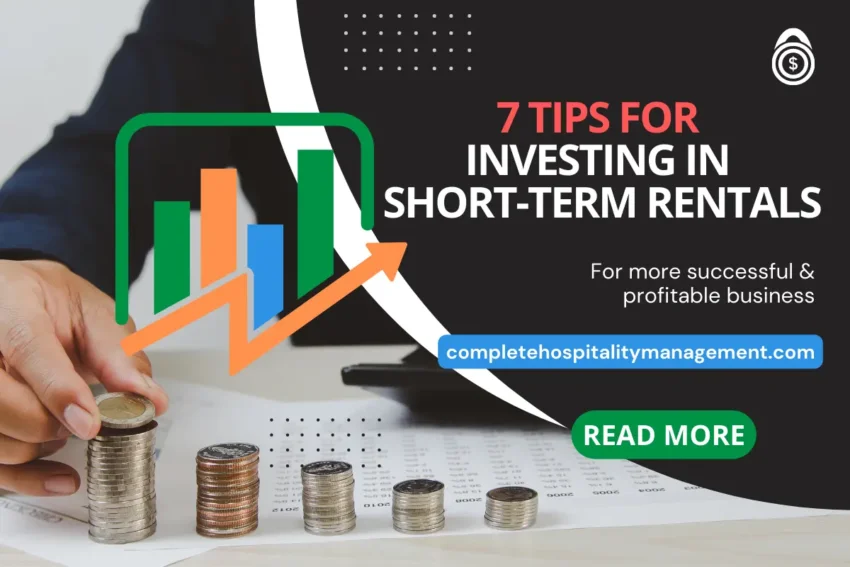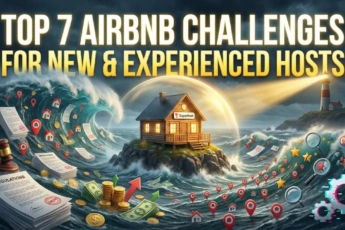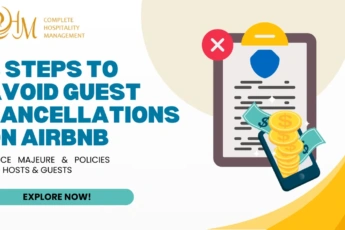7 Best Tips to Invest in Short-Term Rentals and Get High Incomes in 2026
The choice to invest in short-term rentals has surged globally due to various factors: the low-cost tourism revolution in Europe and the USA, driving weekend travel growth; evolving consumer demand for private and personalized accommodations over traditional hotels; and the rise of platforms like Airbnb, VRBO, Booking.com, etc.
And a new fact is that business clients appreciate the short-term rentals, which differ from the hotel and offer common areas/kitchens etc, which are very useful for business travelers. This segment has become a buoyant segment of real estate investment. Here are our 7 tips on how to invest in short-term rentals and achieve success.

7 tips on how to invest in short-term rentals successfully
1. Where to invest in short-term rentals?
As always in real estate: location, location, location! You should definitely consider these tourist areas at first:
- Coasts with year-round sea and sun;
- Mountain towns where skiing is popular in the winter and hiking is popular in the summer;
- Areas that are popular vacation spots all year long;
- Cities that host year-round amusement parks (such as Disneyland);
- Large homes with spacious exteriors and large families are ideal for gatherings (for business or pleasure).
If you choose specific locations for real estate, you may enjoy a steady flow of tourists yearly since tourist demand generates bookings and revenue when the property is advertised for seasonal rental.
2. Highlight your accommodation for short-term rentals
Naturally, our first advice is to construct a strong and long-lasting restoration. It goes without saying that a short-term rental property, whether vacant or furnished, suffers more from frequent entry and exits than a long-term rental property.
- Next, use modern, light furnishings that are not necessary expensive when it comes to the interior design. Offer hotel amenities like two pillows per person, high-quality linens, a coffee maker, a flat-screen TV, very fast internet, and air conditioning.
Finally, everyone overlooks the most important step: hiring a professional photographer with a wide-angle lens. After investing $200,000, do not save $200. This stage is essential since every short-term rental consumer bases their decision on the photos. We have high-standards photo services available for you.
3. How to best market your property for rentals
Here are the 4 secrets to successfully marketing your short-term rental accommodation:
- To avoid repeatedly answering the same questions, create a highly thorough explanation;
- logically arrange the pictures: broad view, close-up of the living room, then of the bedrooms, baths, etc.;
- A cost determined by the SuperHosts on Airbnb in your vicinity; Your property’s pricing, whether per night or per week, plays a significant role in the choice to book, therefore you should establish it with care and knowledge;
- Respond very quickly to requests via your phone, on which you can load Airbnb apps, Booking, VRBO, etc. – if you do not have the time, do not embark on the adventure alone and use the service of an Airbnb co-host;
- You can reassure consumers by accumulating positive reviews (on Airbnb, TripAdvisor, Booking, etc.), showcasing your safety features (extinguisher, smoke detector, alarm, etc.), and providing reliable travel insurance.
4. How to boost your income in property rentals
If your activity is organized when you invest in short-term rentals, you will have yields of around 10% . For two main reasons:
- Not only the tourist industry is expanding, but so are the markets for instructors, business travelers, and family reunions;
- Income, which is typically worth two or three times the monthly rent, is a price per night multiplied by occupancy.
Average incomes for short-term rentals in major world cities
| City | Average daily rate | Occupancy rate | Monthly revenue |
|---|---|---|---|
| New York City | $200-$250 | 65%-70% | $3,900 – $4,875 |
| London | £100-£150 | 65%-70% | £2,730 – £4,050 |
| Paris | €100-€120 | 70%-75% | €2,100 – €2,700 |
| Tokyo | ¥10,000-¥12,000 | 75%-80% | ¥225,000 – ¥288,000 |
| Dubai | AED 350-AED 500 | 60%-65% | AED 6,300 – AED 9,125 |
| Sydney | A$150-A$200 | 70%-75% | A$3,150 – A$4,500 |
| San Francisco | $250-$300 | 70%-75% | $5,250 – $6,750 |
| Hong Kong | HK$800-HK$1,000 | 60%-65% | HK$14,400 – HK$19,500 |
| Singapore | SGD 150-SGD 200 | 75%-80% | SGD 3,750 – SGD 5,600 |
| Berlin | €80-€100 | 75%-80% | €1,800 – €2,400 |
To boost your profitability in short-term rental, consider the next points:
- Have the best equipment: a printer for business customers, a high chair for families, one or even two cots, etc.
- Take the best photos in the neighborhood: photos are THE number one decision-making factor for short-term rental customers
- Become a Superhost by delivering 5-star customer service
- Offer your customers small gifts on arrival: a bottle of wine is not expensive and helps with the 5-star review!
- Don’t limit yourself to Airbnb; list your property on Booking, VRBO, Expedia, Abritel, Tripadvisor etc.
5. Hire a concierge or management company
The platforms make renting an apartment for the price of a hotel room easier. But day-to-day management is complicated, especially obviously from a distance when you are a non-resident.
Call on a hospitality management service that makes everything: management of reservations in several languages, laundry, cleaning, insurance, key collection. This service costs 15% to 30% of the rent collected, but it is compensated by the high return and above all by peace of mind.
Our advice for choosing the right concierge:
- Ask to visit concierge properties in the neighborhood. Check their ability to maintain the goods (cleaning, repairs).
- Look at their listing on Airbnb or Tripadvisor: customer comments are generally unequivocal and will reassure you (or not) about the quality of the concierge service.
- Put quality clauses in your contract to aim for the Airbnb SuperHost.
6. Budget your operating costs for your rentals
Your profitability calculation must consider the total amount of the charges, which are higher than in a furnished rental for the year. And without common measure with those of a bare rental.
List well: full property fees, heating, electricity, water, Internet, insurance, property tax, tourist tax for your customers, service concierge service, regular maintenance, frequent renewal of amenities (sheets etc.)
7. Legal environment for property rentals
Seasonal rental is increasingly supervised in many countries in the world. It is therefore necessary to be careful and to follow the rules that are now clear in the sector.
Key considerations in the short-term rental business
| Description | Considerations |
|---|---|
| Licensing and permits |
|
| Taxation |
|
| Safety standards |
|
| Zoning regulations |
|
| Insurance coverage |
|
| Guest screening |
|
| Accessibility compliance |
|
| Noise and nuisance |
|
| Data privacy |
|
| Environmental standards |
|
| Local community relations |
|
As a conclusion
So, investing in short-term rentals is an omen of good profitability: it is an advantageous investment mode. Still, it is also more entrepreneurial (requires more time and energy) than a bare rental. It’s also burdensome, both from a customer service standpoint and a legal standpoint.
And finally, it is also a major advantage for expatriates: a mode of operation that allows you to have (at almost zero cost) a second home. You can enjoy your property when it is free. This is all the more advantageous if your property is in a holiday area by the sea or a ski resort.
Frequently asked questions on how to
invest in short-term rentals
1. Can you really make money with short-term rentals?
Yes, it is possible to make money with short-term rentals. Short-term rentals, such as those listed on platforms like Airbnb, VRBO, and Booking.com, can be a profitable investment for many property owners and hosts. However, the level of profitability depends on various factors, including:
- Properties in high-demand tourist destinations or areas with a robust business travel market tend to perform better.
- Keeping your property booked regularly with high occupancy rates will generate more income.
- Setting competitive and dynamic rental rates can attract more guests and maximize income.
- Well-maintained properties with attractive amenities tend to command higher rental rates and receive better reviews.
- Properly marketing your rental through appealing listings and promotions can attract more potential guests.
- Keeping operating costs in check helps preserve a larger portion of the rental income.
- Capitalizing on peak seasons and local events can significantly boost earnings.
- Efficiently managing the rental, including communication, check-ins, and property maintenance, is crucial for success.
Before venturing into short-term rentals, conduct thorough market research, create a comprehensive business plan, and consider consulting with experienced hosts or real estate professionals. Short-term rentals can be rewarding but require careful planning and dedication to achieve long-term profitability.
2. What is a good return on a short-term rental?
A good return on a short-term rental is typically considered to have a cap rate of 8% or higher. However, the actual return depends on factors like location, occupancy rate, average daily rate, expenses, and property appreciation. It’s important to research the market and set financial goals to determine what is considered a good return for your specific investment.
3. How do I optimize my short-term rental?
Optimizing your short-term rental is essential to maximize its profitability and attract more guests. Here are some tips to help you optimize your short-term rental:
- Attractive listing. Create an appealing and accurate listing on platforms like Airbnb or VRBO. Use high-quality photos, write a compelling description, and highlight the unique features of your rental.
- Competitive pricing. Research the local market and set competitive rental rates based on factors like location, amenities, and demand. Consider adjusting prices based on seasonal fluctuations or events in your area.
- Superb cleanliness. Ensure your rental is spotlessly clean and well-maintained. Positive reviews are crucial for attracting more guests, and cleanliness is a top priority for travelers.
- Provide amenities. Offer amenities that enhance your guests’ experience, such as Wi-Fi, a well-equipped kitchen, toiletries, comfortable bedding, and entertainment options.
- Personal touch. Add personal touches to make guests feel welcome, like providing a welcome basket, local recommendations, or a handwritten note.
- Efficient communication. Respond promptly to guest inquiries and be available to address any issues during their stay.
- Guest reviews. Encourage guests to leave reviews. Positive reviews can build trust with potential guests and improve your visibility on booking platforms.
- Implement smart pricing. Use dynamic pricing tools that adjust rates based on demand, occupancy, and other factors to maximize your rental income.
- Seasonal decorations. Consider adding seasonal decorations or themes to create a welcoming ambiance that aligns with different times of the year.
- Flexible check-in/check-out. Offer flexible check-in and check-out options whenever possible to accommodate guest schedules.
- Stay on top of maintenance. Regularly inspect your property to ensure everything is in good condition.
- Legal and safety compliance. Comply with local laws and regulations related to short-term rentals, including safety standards, permits, and taxes.
- Invest in marketing. Use social media and online ads to promote your rental and reach a wider audience.
- Gather guest feedback. Encourage guests to provide feedback and use it to improve your rental.
By optimizing your short-term rental based on guest feedback and market trends, you can create a positive experience for guests, improve your rental’s reputation, and increase its overall profitability.
4. What is short term investing?
Short-term investing involves buying and selling financial assets to profit from price fluctuations over a brief period. It’s more speculative and riskier than long-term investing, requiring a good understanding of the markets and risk management. It’s not recommended for inexperienced investors or those with low-risk tolerance.
5. What are most profitable rentals?
The profitability of rental properties can vary based on several factors, including location, market demand, property type, and individual investment strategies. However, some rental properties tend to be more consistently profitable than other, especially:
- Vacation rentals in popular tourist destinations.
- Short-term rentals in urban areas with high demand.
- Multi-unit properties for multiple streams of income.
- Student Housing near colleges and universities.
- Single-family homes in desirable neighborhoods.
- Corporate Housing for business travelers.
- Optimized properties with traveler-friendly features.
- Low-cost properties in high-demand rental areas.
- Properties in emerging markets with growth potential.
- Renting out a portion of your primary residence.
Keep in mind that the most profitable rental properties require careful research, due diligence, and an understanding of local market dynamics. Additionally, rental property profitability is not solely determined by property type but also by how well the property is managed, the local rental market conditions, and the overall economic environment. Always consult with real estate professionals and financial advisors before making any investment decisions.
6. What is the average profit margin for short term rentals?
The average profit margin for short-term rentals can vary significantly depending on several factors, including the property’s location, the rental demand in that area, the type of property, the time of year, and the expenses associated with running the rental.
A common rule of thumb is that a profitable short-term rental should have a gross rental income (the total revenue before expenses) at least 1% of the property’s total monthly value. For example, if a property is valued at $300,000, you would ideally want it to generate at least $3,000 in gross rental income per month.
The net profit margin, which is the income after all expenses, is typically estimated to be around 20% to 50% of the gross rental income. However, this can vary widely based on factors such as mortgage payments, property management fees, maintenance costs, taxes, insurance, utilities, and marketing expenses.
It’s essential to conduct a thorough financial analysis and consider all expenses associated with the short-term rental to get a more accurate picture of the potential profit margin for a specific property. Additionally, the short-term rental market is constantly changing, so it’s crucial to research the current market conditions and trends in the area you are interested in.
7. How can I make money on vacation?
Making money while on vacation can be an exciting prospect, as it allows you to enjoy your time off while still earning some extra cash. Here are some ways you can potentially make money during your vacation:
- Work remotely if possible.
- Offer freelance services online.
- Rent out your property on Airbnb.
- Sell products online.
- Participate in surveys or market research.
- Start a travel blog or vlog.
- Be a tour guide.
- Sell your travel photos on stock websites.
- Look for temporary local work.
- Offer tutorials or workshops based on your expertise.
While making money during your vacation can be fun, it’s also important to balance work and leisure to ensure you still get the most out of your vacation experience. Always check local regulations and ensure any activities you undertake are legal and in line with the terms of your vacation.
Updated on: . Author:






